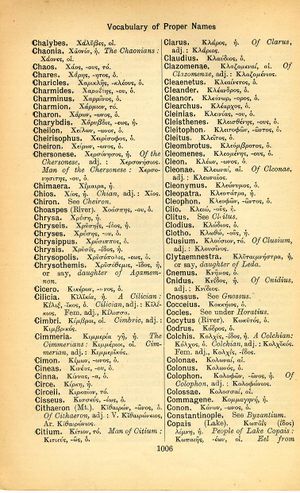Colophon: Difference between revisions
μηδέν' ὀλβίζειν, πρὶν ἂν τέρμα τοῦ βίου περάσῃ μηδὲν ἀλγεινὸν παθών → Count no man blessed 'til he's passed the endpoint of his life without grievous suffering. (Sophocles, King Oedipus 1529f.)
(6_3) |
|||
| Line 5: | Line 5: | ||
}} | }} | ||
{{Lewis | {{Lewis | ||
|lshtext=<b>Cŏlŏphon</b>: ōnis (acc. -nem, Cic. Imp. Pomp. 12, 33;<br /><b>I</b> -na, Vell. 1, 4, 3; Tac. A. 2, 54), m., = Κολοφών, one of the [[twelve]] Ionian towns in [[Lydia]], [[situated]] [[near]] the [[sea]], and [[renowned]] for its [[cavalry]], [[now]] perh. Zille or Altobosco, Mel. 1, 17, 2; Cic. Imp. Pomp. 12, 33; Liv. 37, 26, 5 sq.; Hor. Ep. 1, 11, 3. —<br /><b>II</b> Hence,<br /> <b>A</b> Cŏlŏphōnĭus, a, um, adj., Colophonian: [[resina]], Plin. 14, 20, 25, § 123 (also absol.: Colophonia, Scrib. Comp. 137 sq.): [[Idmon]], Ov. M. 6, 8.—In | |lshtext=<b>Cŏlŏphon</b>: ōnis (acc. -nem, Cic. Imp. Pomp. 12, 33;<br /><b>I</b> -na, Vell. 1, 4, 3; Tac. A. 2, 54), m., = Κολοφών, one of the [[twelve]] Ionian towns in [[Lydia]], [[situated]] [[near]] the [[sea]], and [[renowned]] for its [[cavalry]], [[now]] perh. Zille or Altobosco, Mel. 1, 17, 2; Cic. Imp. Pomp. 12, 33; Liv. 37, 26, 5 sq.; Hor. Ep. 1, 11, 3. —<br /><b>II</b> Hence,<br /> <b>A</b> Cŏlŏphōnĭus, a, um, adj., Colophonian: [[resina]], Plin. 14, 20, 25, § 123 (also absol.: Colophonia, Scrib. Comp. 137 sq.): [[Idmon]], Ov. M. 6, 8.—In plur.: Cŏlŏphōnii, ōrum, m., the Colophonians, Cic. Arch. 8, 19.—<br /> <b>B</b> Cŏlŏphōnĭăcus, a, um, adj., the [[same]]: [[Homerus]] ([[since]] the inhabitants of [[Colophon]] considered him as [[their]] [[countryman]]; v. Cic. Arch. l. l.), Verg. Cir. 64; Cels. 5, 19, 11; 5, 19, 17. | ||
}} | }} | ||
Revision as of 09:23, 13 August 2017
English > Greek (Woodhouse)
Κολοφῶν, -ῶνος, ἡ.
Of Colophon, adj.: Κολοφώνιος.
Latin > English (Lewis & Short)
Cŏlŏphon: ōnis (acc. -nem, Cic. Imp. Pomp. 12, 33;
I -na, Vell. 1, 4, 3; Tac. A. 2, 54), m., = Κολοφών, one of the twelve Ionian towns in Lydia, situated near the sea, and renowned for its cavalry, now perh. Zille or Altobosco, Mel. 1, 17, 2; Cic. Imp. Pomp. 12, 33; Liv. 37, 26, 5 sq.; Hor. Ep. 1, 11, 3. —
II Hence,
A Cŏlŏphōnĭus, a, um, adj., Colophonian: resina, Plin. 14, 20, 25, § 123 (also absol.: Colophonia, Scrib. Comp. 137 sq.): Idmon, Ov. M. 6, 8.—In plur.: Cŏlŏphōnii, ōrum, m., the Colophonians, Cic. Arch. 8, 19.—
B Cŏlŏphōnĭăcus, a, um, adj., the same: Homerus (since the inhabitants of Colophon considered him as their countryman; v. Cic. Arch. l. l.), Verg. Cir. 64; Cels. 5, 19, 11; 5, 19, 17.

